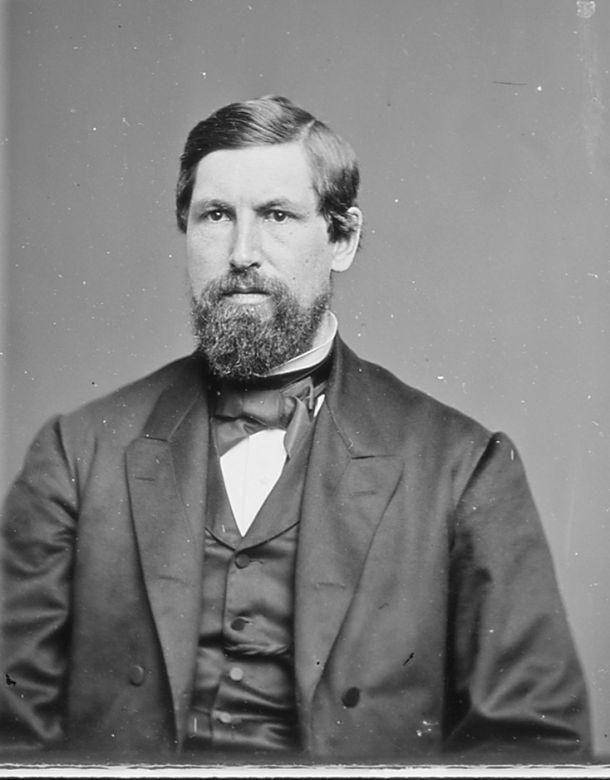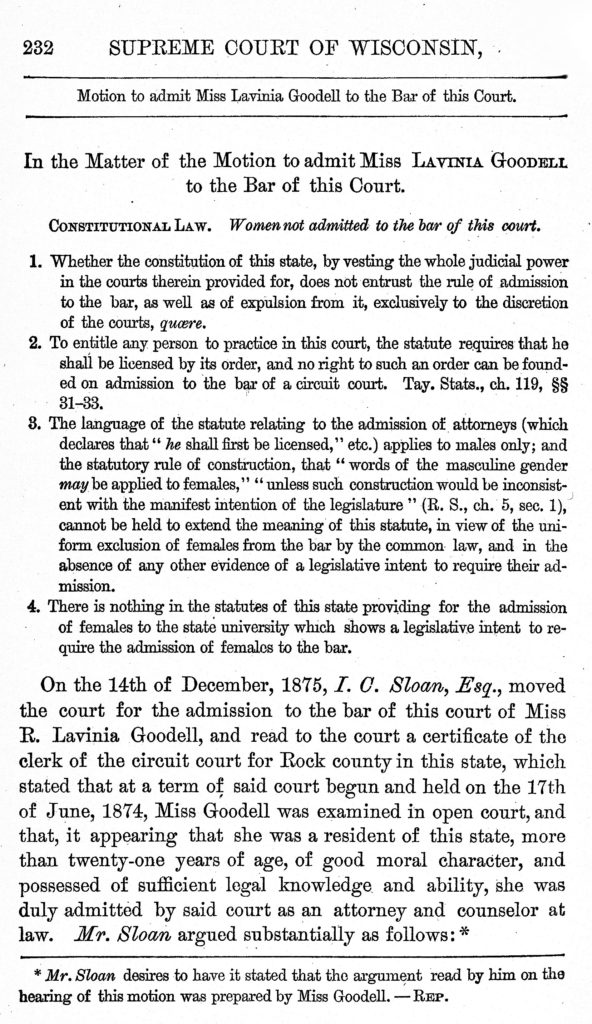“Mr. Sloan read my argument. Judge Ryan mad as a bull.”
Lavinia Goodell, December 14, 1875
When Lavinia Goodell applied for admission to the Wisconsin Supreme Court bar in 1875, she was not allowed to present the motion to the court herself. Instead, her argument was read by Assistant Attorney General I.C. Sloan. Along with J.B. Cassoday, Sloan, a former Janesville attorney, was one of the people who made Lavinia’s admission to the Supreme Court bar possible.

Ithamar Conkey Sloan was born in Morrisonville, New York in 1822. He began practicing law in New York state and moved to Janesville, Wisconsin in 1854. He was elected Rock County District Attorney soon thereafter. In 1860 he was elected to Congress and served there until 1864. He then returned to his law practice in Janesville. In 1874, his brother, A.S. (Andrew Scott) Sloan, Wisconsin’s Attorney General, appointed I.C. Sloan to the position of Assistant Attorney General. Not surprisingly, some accused A.S. Sloan of nepotism. However, by all accounts I.C. Sloan carried out the duties of his position with honor. By the time A.S. Sloan was running for judge in 1878, the Oshkosh Northwestern newspaper printed a long letter praising I.C. Sloan:
No better man could have been procured for Assistant Attorney General than I.C. Sloan. He is known throughout the state as an excellent lawyer.
Along with his duties as Assistant Attorney General, I. C. Sloan also began teaching equity, real estate, and corporations at the law school and later served as the Dean of the law faculty. In 1877, he was instrumental in the formation of a committee to report a plan for the formation of a State Bar Association.
We do not know how Lavinia first became acquainted with I.C. Sloan or how she chose him to present her petition for admission to the Supreme Court bar in 1875. Lavinia first mentions corresponding with him in July 1875. On December 13, 1875, Lavinia took the train to Madison and later wrote in her diary, “In evening visited Mr. Sloan in Capitol & talked over my case.” The following day she wrote, “A rich time this morning at Supr. Ct. Mr. Sloan read my argument & enlarged, Judge Ryan mad as a bull when he sees a red rag kept out all time. Decision as to my admission reserved.”
Sloan had made clear to the Supreme Court justices that Lavinia alone had drafted the argument, and he expressed himself warmly in favor of granting it. When Chief Justice Ryan‘s famous decision denying the petition was printed in the Wisconsin Reporter, it, too, noted that Sloan gave Lavinia full credit for the argument he had presented:

Lavinia’s last mentions of Sloan were in October of 1879 when she mentioned visiting with him while she was in Madison attending the Women’s Congress. When she moved to Madison the following month, she noted that Sloan’s wife, Fanny, was among her first visitors.
In June 1877, Sloan delivered an address to the law school graduates in the Assembly chamber at the State Capitol in Madison. The June 19, 1877 Wisconsin State Journal reprinted the address in full. It occupied three-quarters of page four of the paper. Lavinia would have likely agreed whole heartedly with the advice he gave the new lawyers:
The doors of the temple of justice are always open, all who can show the necessary qualifications of learning and character are invited to enter and minister at her altars. She takes no note of the facetious distinctions of rank, wealth and worldly conditions of men; the poor and friendless are as welcome to her regards and her favors of the rich and powerful. She makes but one distinction, and that is the distinction of merit. She insists alone upon learning and good character, these she welcomes in whatever rank or condition, and whatever class or circumstances they may be found.
A lawyer should never for a moment forget that the great end and object of all his labors is to discover and establish what is true; what is right, what is just; that in proportion as he succeeds in reaching his goal, in that proportion will he advance the interest, and secure the final success of his clients. His duty and his interest here coincide, for in proportion to the success of his clients will be his own advancement towards the honors and emoluments of his profession.
Sloan died in Janesville in 1898. The Weekly Wisconsin newspaper said:
The career of Mr. Sloan was alike honorable and useful” and he was “accounted one of the most eminent lawyers in the state…. He was a profound thinker and his reputation was high and well founded. He was a close student and had a remarkably clear insight into difficult problems and the happy faculty of presenting them as clearly at the bar.
Sources consulted: Lavinia Goodell’s diary; 1887 Wisconsin Blue Book; Wisconsin State Journal (December 15, 1875; June 19, 1877; September 27, 1877; April 22, 1879); The Weekly Wisconsin (Milwaukee, Wisconsin); Dunn County News (January 17, 1874); Oshkosh Northwestern (March 22, 1878); (December 31, 1898); New York Times (December 31, 1898).







